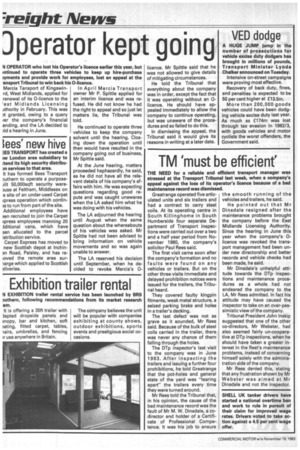TM 'must be efficient'
Page 14

If you've noticed an error in this article please click here to report it so we can fix it.
THE NEED for a reliable and efficient transport manager was stressed at the Transport Tribunal last week, when a company's appeal against the loss of its operator's licence because of a bad maintenance record was dismissed.
Greatrange operated five articulated units and six trailers and had a contract to carry steel coils. At its operating centre in South Killinghome in South Humberside four separate Department of Transport inspections were carried out over a two and a half year period from November 1980, the company's solicitor Paul Rees said.
The first visit came soon after the company's formation and no faults were found on any vehicles or trailers. But on the other three visits immediate and delayed prohibition notices were issued for the trailers, the Tribunal heard.
They covered faulty kingpin fitments, weak metal structure, a seized parking brake and holes in a trailer's decking.
The last defect was not as grave as it sounded, Mr Rees said. Because of the bulk of steel coils carried in the trailer, there was never any chance of them falling through the holes.
The DTp inspector's last visit to the company was in June 1983. After inspecting the trailers and issuing a further four prohibitions, he told Greatrange that the pot-holes and general state of the yard was "tearing apart" the trailers every time they were turned around.
Mr Rees told the Tribunal that, in his opinion, the cause of the bad maintenance record was the fault of Mr M. W. Dinsdale, a codirector and holder of a Certificate of Professional Competence. It was his job to ensure the smooth running of the vehicles and trailers, he said.
He pointed out that Mr Dinsdale resigned after the maintenance problems brought the company before the East Midlands Licensing Authority. Since the hearing in June this year when the company's 0licence was revoked the transport management had been under new directorship and better records and vehicle checks had been made, he said.
Mr Dinsdale's unhelpful attitude towards the DTp inspections and maintenance procedures as a whole had not endeared the company to the LA, Mr Rees admitted. In fact his attitude may have caused the inspector to take on an over-pessimistic view of the company.
Tribunal President John Inskip suggested that one of the other co-directors, Mr Webster, had also seemed fairly un-cooperative at DTp inspections, when he should have taken a greater interest in the fleet's maintenance problems, instead of concerning himself solely with the administration side of the company.
Mr Rees denied this, stating that any frustration shown by Mr Webster was aimed at Mr Dinsdale and not the inspector.




























































































